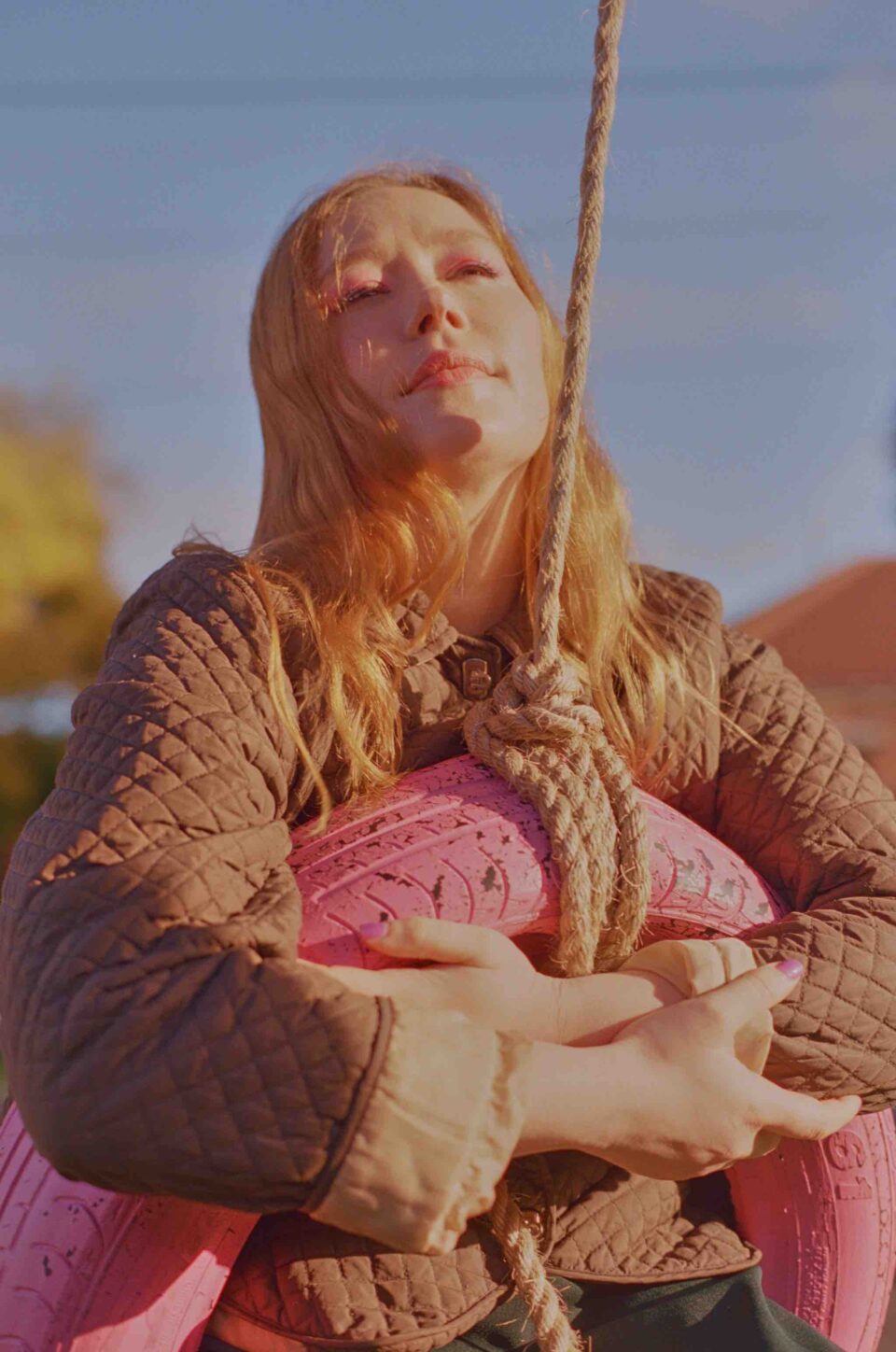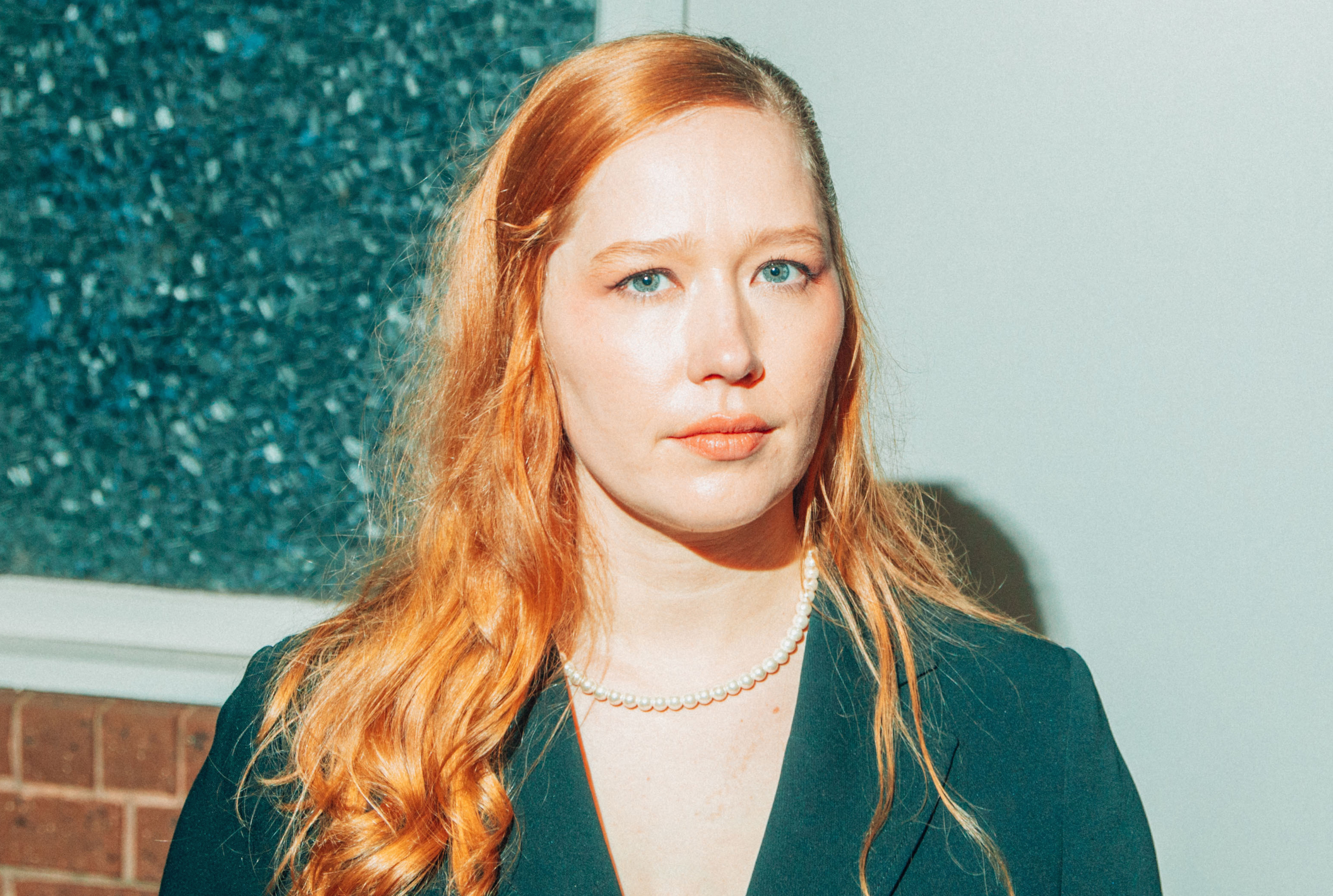In 2019, Julia Jacklin released Crushing, a record that in its most volatile moments navigated an emotionally eviscerating sense of heartbreak. From that devastation, it charted the uneasy journey of regaining one’s sense of self-esteem and confidence after undergoing such a turbulent time. It also led Jacklin to forge the foundation for her next and latest album Pre Pleasure, a title that suggests she’s on the precipice of happiness but not quite able to fully grasp it.
Often we’re made to believe that there’s an end goal, that once we put in the hard yards our relationships will fall into place, that we enter this place of zen as we get older. But Jacklin’s new album discusses how fulfillment is an ongoing cycle. Change is a constant factor in all of our relationships, whether they be romantic, platonic, or sexual. Embracing life’s lack of stillness may just make it that much easier.
Ahead of the record’s release, we spoke to Jacklin about setting boundaries, her favorite musical, and what to expect from her upcoming world tour.
You stepped away from the guitar in favor of keys when writing Pre Pleasure. Are you looking to purposely test your own boundaries when making new music, or does mixing things up come naturally?
Honestly I just wasn’t writing anything on guitar. I was feeling really stuck with the limitations of my guitar knowledge. I don’t seem to get better at guitar. I’ve never really had lessons, and I’ve never really dived into being a guitarist—I’m just like, “Guitar is a tool of the trade.” I like guitar. I can appreciate it, but I’m not, like, a “guitar person.”
I just found that I was doing the same things all the time. I’m sure on piano I was probably playing the same chords, but it just literally makes different pathways line up in your brain. So I think that was a big thing, just changing. I wrote a lot of this record just with a drum machine and a keyboard, and then put some songs to guitar afterward. But yeah, it was kind of just to pull me out of writing the same songs all over again.
“This record’s kind of more realizing self-growth and that your relationships are basically going to be a continuous conversation until you die. That’s kind of cool and exciting, but also a pretty exhausting realization.”
Would you say solitude is important to writing new songs?
Yeah, absolutely. I think that if someone is in any way able to listen to me whilst I’m writing stuff I’m just paralyzed by embarrassment. I can’t have any person in a good 50 meter vicinity around me. Which is kind of hard to find sometimes, but I’ve definitely never written a song with somebody else in the room. That just feels embarrassing.
Do you ever switch it up and write in different locations, or do you prefer to stay home?
I don’t think I’ve ever written a song at home. Home feels sacred—keep the work out of there. It’s usually on the road or when I’m in the hotel room by myself. Writing this record, I lived by myself in Montreal, so I wrote a lot of it there. I don’t like to mix work and pleasure.

“I think I’m a little bit softer now, which is an easier way to move through the world.”
Crushing was an album where you started setting some of your own boundaries and becoming more confident gradually. The lyric on “I Was Neon,” “Am I going to lose myself again?,” suggests that you feel as though the progress you made could come undone. How do you try to counter self-doubt in those moments?
I think it just gets a little more complicated as you get older. When I wrote Crushing I was feeling really liberated by it being the first time in my life where I felt like I had boundaries, that I felt like I deserved boundaries, and it was the first time I’d ever kind of enforced boundaries in my life. I think with this record, it’s kind of realizing that your boundaries are things that you’ll have to continuously enforce your entire life. They’re not something that you can just call every single person in your life and be like, “Right, OK, here’s my yeses and here’s my nos,” and then you can just sail off into the sunset with all of your friends and family and have this beautiful level of understanding with each other.
This record’s kind of more realizing that self-growth and that your relationships are basically going to be a continuous conversation until you die. That’s kind of cool and exciting, but also a pretty exhausting realization. I think that’s maybe where we go wrong as we get older, as we either choose to jump on that exhausting train or just kind of be like, “Oh, that just seems too hard,” and you kind of let all your relationships calcify and just accept that that’s the way it’s always gonna be.
“I Was Neon” is a song where you’re saying that you quite like the person who you are now. What are the main differences between the Julia who released Crushing and now?
I think I just know myself better, which we all do as we get older. I’m less hard on myself and therefore I’m less hard on everyone else around me. I think I’m a little bit softer now, which is an easier way to move through the world.
On “Lydia Wears a Cross” you reference Jesus Christ Superstar. How important has that musical been to you?
It was very important. It’s part of the reason why I’m doing this whole thing. It could have been anything else [that influenced me], but it was Jesus Christ Superstar at, like, eight years old—particularly Carl Anderson who plays Judas and sings that opening song. It was the kind of performance that burned a hole into my brain. I still watch that performance to this day and I still feel as inspired by it now as I was when I was eight.
“It could have been anything else that influenced me, but it was Jesus Christ Superstar at, like, eight years old—particularly Carl Anderson who plays Judas and sings that opening song.”
Would you ever consider writing a musical one day?
Oh absolutely. I’m not a full-on musical person, but I like the formula a lot. I think it gets a bad rap in the “cool” community, but I think it’s such a cool thing to tell a story with a bunch of songs like that. That’s literally what we’re all doing anyway—we’re all doing musical theater, basically.
You’re heading out on a world tour this year. What have you been thinking in terms of your approach to these shows?
I’m just going to try and step it up a little bit so I don’t feel as much pressure every night. For the audience, it helps if the artist is going to put a bit more effort in. This is the first time where I have three albums, which is a weird challenge. Like how do you fit three different areas of your life into an hour and 15 minutes?
I’m just thinking about trying to be a better version of myself, and also trying to genuinely appreciate it whilst I’m doing it. This is bigger than I ever imagined my career was going to be, and I don’t want to keep stressing that it’s not where it should be. FL







